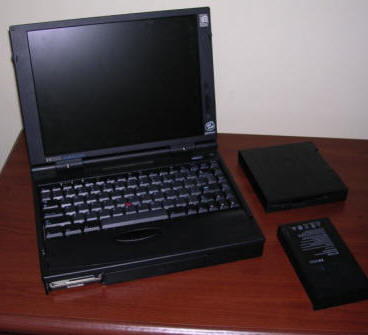HP Omnibook 2000ct
HP sold many good computers in their history, this is
another nice model with Pentium processor and expandable RAM. It has a
multi-function bay which can be used with CD-ROM drive or floppy disk
drive. If floppy drive is needed only for a moment, it may be connected
to specialized parallel port. 2000ct has most components in proprietary
boards, so it's not possible to upgrade with common parts easily but,
for example, in my unit there's a CPU from 5500ct model (Pentium 133MHz
with MMX) and it still works well.
Omnibook 2000ct was advertised as low-priced notebook with multimedia
capabilities. Its LCD is really good, 2000ct has microphone and
speakers, Sound Blaster Pro compatible card and very good docking
support, in which docking station had expansion slots for cards and bays
for drives. By adding SCSI to the dock it was possible to build a
good-performance system with Omnibook as its CPU.
In 2013 my Omnibook still works for 2-3 hours on one battery pack.
Battery packs are from 1997, so it's a very good result, probably not
possible with current hardware.
| Manufacturer | Hewlett-Packard | |
| Origin | Taiwan | |
| Year of unit | 1997 | |
| Year of introduction | 1997 | |
| Type | Laptop, PC | |
| CPU | Intel Pentium I, 133MHz | |
| RAM | 32MB (2x16MB) - max 64MB | |
| Floppy Disk | 3.5" 1.44MB external or internal (drive bay) | |
| Hard Disk | 2GB | |
| Other media | CD-ROM in a bay | |
| Graphics and display: | VGA (PCI Chips and Technologies adapter), 800x600 24-bit TFT LCD. | |
| Sound: | PC Speaker, SoundBlaster card with speakers and microphone | |
| Keyboard and pointing device: | Small PC keyboard without
numeric part, numeric part on letter keys. Trackpoint |
|
| OS: | Windows 3.x / Windows 95 | |
|
Power supply: |
||
|
1 - +12V 3,3A |
||
| I/O: | - Serial port - Parallel port - VGA video out - PS/2 - Dock connector - Game port (proprietary connector) - PCMCIA x2 |
|
| Possible upgrades: | Memorty with 2 proprietary modules | |
| Additional peripherals: | Additional battery, Floppy disk drive |
Its BIOS is simple, allows to configure most things by semigraphical setup. There are some things not commonly seen such as hibernation to a special disk partition (use supplied tools to make one), but only if laptop is working from battery.
I'm using this notebook as "file server" for transferring programs to other old computers with parallel port and sometimes quick data collector/notepad. It's very comfortable for me as it has nice keyboard with deep keys, not flat ones as in today's laptops. Hard disk can be easily expanded up to 8GB, if not more (I have 6GB without problems).
|
|
Installation guide |
|
|
Corporate usage manual |
|
|
Accessories guide |
|
|
Hardware diagnostics manual |
|
|
User's Guide: Win95 |
|
|
User's guide: Windows 3.11 |
|
|
BIOS update WARNING! Improper flashing may damage your computer! |
|
|
Hibernation partition making software. Remember to make it 3-4MB larger than your RAM to save VRAM/registers! |
|
|
Windows 95 diagnostic tools |
|
|
Windows 95 DMI tools |
|
|
Windows 95 drivers |
|
|
Windows 95 Utilities: Disk1 Disk2,3 |
|
|
Windows NT drivers |
|
|
Windows NT tools: Disk1 Disk2 |
|
|
Windows NT PCMCIA software: Part1 Part2 |
|
|
OS/2 drivers |
|
|
Windows for Workgroups drivers 1 (CD-ROM, sound) |
|
|
Windows for Workgroups drivers 2 (PCMCIA, dock, IRDA, mouse) |
|
|
Windows for Workgroups drivers 3 (Dock's SCSI, video) |





